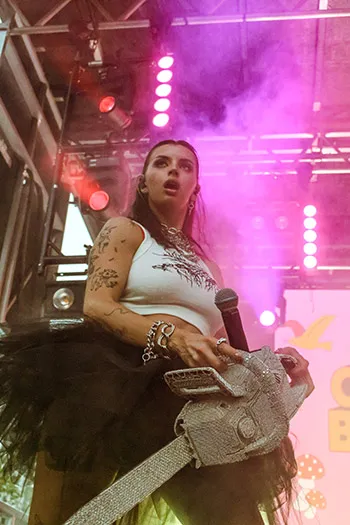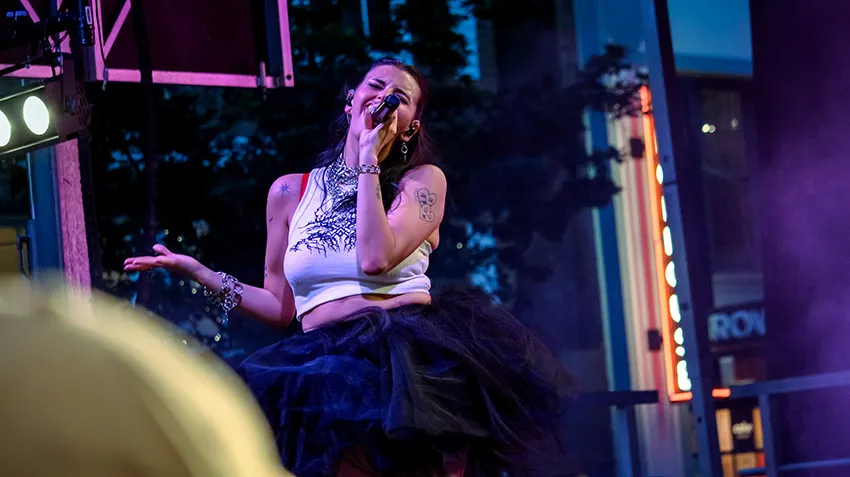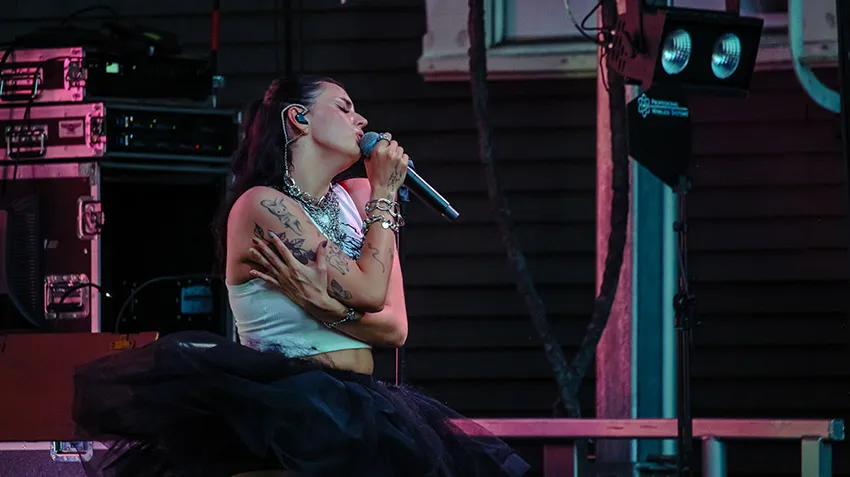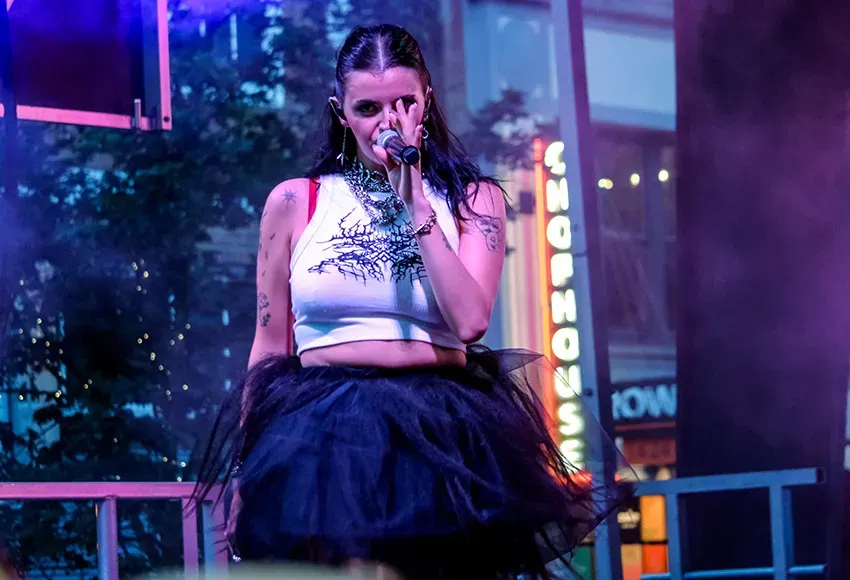On Friday, July 21, on the Vera Stage at the Capitol Hill Block Party, Rebecca Black proved herself a star reborn. In the decade since her 13-year-old-self crash landed in internet virality with the release of "Friday," she has reconnected with her love of performance, and she demonstrated her authentic talent to Seattle's favorite block party as part of her headline Let Her Burn tour.
Now 26 years old, Queer, and boasting a debut album, Black brought a horde of excited and curious Capitol Hill Block Party listeners up to speed with a setlist primarily focused on tracks from Let Her Burn, such as "Misery Loves Company," with its ultra-catchy chorus integrating hyperpop – a new Rebecca Black trademark –– and "Sick To My Stomach," a light yet angsty pop anthem for anyone still caught up on their ex-long-term, long-distance, low-commitment girlfriend.
To catch up with the artist, we arranged to meet in her green room for an SGN exclusive interview following her performance.

Overcoming the haters
When Black first entered the music scene, she became the target of criticism and internet harassment for the simple lyrics and highly autotuned production on "Friday" – yet the teen had had little involvement in the song's construction.
In pursuit of her ambition Black had decided to enter the industry by releasing a music video in 2011. She and her mother approached a music composition and production company because it was more accessible than a record label, and the company promised her a song. After procrastinating on its deliverable until late one tired and fateful Friday night, the company wrote "Friday."
Having experienced the internet's mostly hateful reaction to her single, Black left the industry with stage fright and broken confidence, which she says she spent years overcoming.
Taking the stage at the Capitol Hill Block Party, today's Rebecca Black demonstrated a cool comfort as she leaned into her past fame and, to the delight of listeners, performed her 2021 "Friday" remix, a Queered, hyperpop take on the hit featuring Big Freedia, Dorian Electra, and 3OH3!
In the song "Destroy Me," Black also takes time to acknowledge the feeling of negative public perception, but she does it sarcastically: "God, am I just a loser? / Bet that's what they always say." Climaxing with a breakbeat drum drop, the song calls haters to attention: "Go ahead destroy me, destroy me." The song's beat verges on glitchcore rock, reminiscent of 100 Gecs' electronic drama, deepening the message that she does not care.
"When I'm onstage now, I feel like I have nothing to lose," Black said.

Rebecca Black's Queer identity shaped her music
Black didn't get to this point overnight. "That process was quite long," said Black.
Through the years, Black says she felt an "instinctive" need to come back to music. "I grew up as a kid that was drawn to theater, drawn to performing, drawn to dancing, to singing. That was where I found my independence and my creativity," she said. "I guess that feeling just never went away."
To get back to her passions, Black began to reconnect with those parts of herself that she had been in touch with as a kid. "I think that we do have these instincts as kids, as far as what drives us, what brings us joy, what brings us the purpose that we're looking for."
A major catalyst for reconnecting with her musical side, she told me, was coming out of the closet, which launched her into the writing process for her EP and album. "Coming out as Queer was a huge moment for me in how I make choices for myself," she said. "It was one of the first moments where I think I trusted my own instinct over anyone else."
On a personal level, coming out helped her break away from the ideology that she was taught initially: not taking leadership and not trusting her own instincts. "Growing up as a kid in the industry, for a long time you are taught to do anything but that. You're taught that you're new and naive and don't know anything."
In the process of coming out, Black had so much renewed creativity that she wrote her EP Rebecca Black Was Here while also writing singles that wouldn't be released until it was time for an album.

The long Gay road to Let Her Burn
"I was dying to fucking put out an album for years. Obviously I wanted to show that part of myself and give myself hopefully some legitimacy," she said, "but I just wasn't ready yet. As much as I needed to trust myself, I also finally met the right people."
She described not only former agents and producers berating and belittling her for speaking her mind, but even women joining in and encouraging her to stay small. By that time, Black had been told how to behave and what to sing about for too long.
"As I started writing the music and the music got Gayer, I just knew that that was what I needed to do," she said. "I was holding myself back and holding my audience back in a way that I knew we could connect."
Songs like "Look At You," a yearning, almost indie-pop ballad showcasing Black's true vocal range, proved impactful to the audience at the Capitol Hill Block Party. Some were moved to dance, and some used their phone flashlights as if they were slowly waving lighters above their heads.
In her green room behind the Vera Stage, Black said, laughing, "It's no coincidence that my audience –– and I check with them most nights – they're Gay!" While connecting with her audience, she continues to dig deep with her music into her own self-expression.
Coined "one of Queer pop's It Girls" by OUT Magazine, today's Rebecca Black is empowered, attuned with her inner child's intuition, and has found a community that doesn't berate her or police her actions. "Trying to navigate this as I've been growing up has allowed for a lot of pivotal and cliche moments," she said. "The process was long, but nurturing."
Stream or download Let Her Burn, an album that demonstrates Black's impressive songwriting skills and vocal capacity. Let your mind be changed about this artist if it hasn't been already.
Let Her Burn is available on Spotify, Apple Music, Pandora, and YouTube Music.


